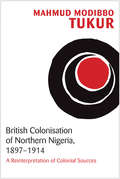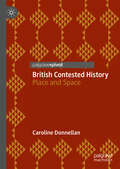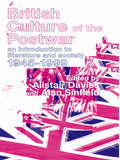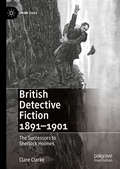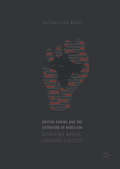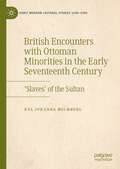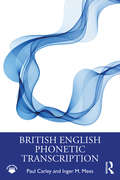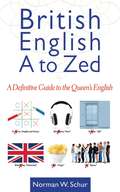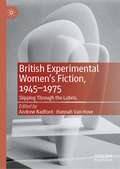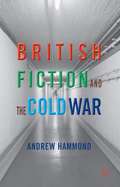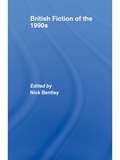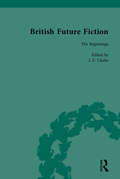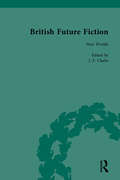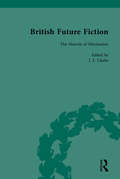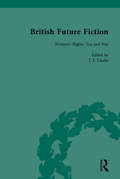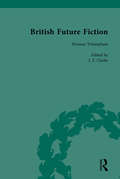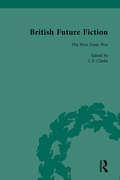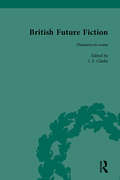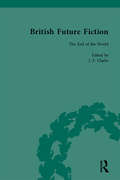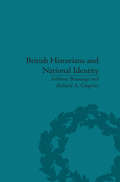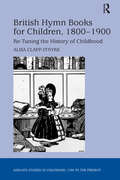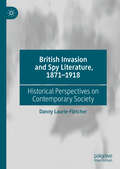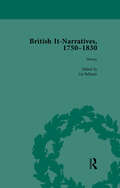- Table View
- List View
British Colonisation of Northern Nigeria, 1897-1914: A Reinterpretation of Colonial Sources
by Mahmud Modibbo Tukur Michael J. Watts"In this densely detailed and interpretatively nuanced study, Mahmud Modibbo Tukur lays bare the very foundations of the colonial state in what is now northern Nigeria. This is a must read for anyone wanting to understand the foundations of contemporary Nigeria and how we came to be what we are." - Prof. Abdul Raufu Mustapha, University of Oxford, UK. Mahmud Modibbo Tukur's work challenges fundamental assumptions and conclusions about European colonialism in Africa, especially British colonialism in northern Nigeria. Whereas others have presented the thesis of a welcome reception of the imposition of British colonialism by the people, the study has found physical resistance and tremendous hostility towards that imposition; and, contrary to the "pacification" and minimal violence argued by some scholars, the study has exposed the violent and bloody nature of that occupation. Rather than the single story of "Indirect rule", or "abolishing slavery" and lifting the burden of precolonial taxation which others have argued, this book has shown that British officials were very much in evidence, imposed numerous and heavier taxes collected with great efficiency and ruthlessness, and ignored the health and welfare of the people in famines and health epidemics which ravaged parts of northern Nigeria during the period. British economic and social policies, such as blocking access to western education for the masses in most parts of northern Nigeria, did not bring about development but its antithesis of retrogression and stagnation during the period under study. Tukur's analysis of official colonial records and sources constitutes a significant contribution to the literature on colonialism in Africa and to understanding the complexity of the Nigerian situation today.
British Contested History: Place and Space
by Caroline DonnellanThis book examines the issues arising from British contested history by looking at how it came to be constructed, how it developed, and how attitudes over time have begun to change towards it. It considers how this narrative was first created through the writing of British history. It explores the private spaces of the court, the political places of the state, and the public places of the street. Beyond British shores this history has also been enacted through international heritage sites when objects were removed and taken back to Britain. Conclusively, it explores how the historic spaces of a maritime city, has further entrenched an already complex history of the nation. How this research brings new insights into this field is by looking at it through the lens of place, space, and the spatial turn. The underlining research questions are: What role does place and space play in historical constructions of the past? How do place and space contribute to contested history? How can these places and spaces be re-appropriated and reused, and endowed with new meanings?
British Culture of the Post-War: An Introduction to Literature and Society 1945-1999
by Alan Sinfield Alistair DaviesFrom Angus Wilson to Pat Barker and Salman Rushdie, British Culture of the Post-War is an ideal starting point for those studying cultural developments in Britain of recent years. Chapters on individual people and art forms give a clear and concise overview of the progression of different genres. They also discuss the wider issues of Britain's relationship with America and Europe, and the idea of Britishness.Each section is introduced with a short discussion of the major historical events of the period. Read as a whole, British Culture of the Postwar will give students a comprehensive introduction to this turbulent and exciting period, and a greater understanding of the cultural production arising from it.
British Detective Fiction 1891–1901: The Successors to Sherlock Holmes (Crime Files)
by Clare ClarkeThis book examines the developments in British serial detective fiction which took place in the seven years when Sherlock Holmes was dead. In December 1893, at the height of Sherlock’s popularity with the Strand Magazine’s worldwide readership, Arthur Conan Doyle killed off his detective. At the time, he firmly believed that Holmes would not be resurrected. This book introduces and showcases a range of Sherlock’s most fascinating successors, exploring the ways in which a huge range of popular magazines and newspapers clamoured to ensnare Sherlock’s bereft fans. The book’s case-study format examines a range of detective series-- created by L.T. Meade; C.L. Pirkis; Arthur Morrison; Fergus Hume; Richard Marsh; Kate and Vernon Hesketh-Prichard— that filled the pages of a variety of periodicals, from plush monthly magazines to cheap newspapers, in the years while Sherlock was dead. Readers will be introduced to an array of detectives—professional and amateur, male and female, old and young; among them a pawn-shop worker, a scientist, a British aristocrat, a ghost-hunter. The study of these series shows that there was life after Sherlock and proves that there is much to learn about the development of the detective genre from the successors to Sherlock Holmes.“In this brilliant, incisive study of late Victorian detective fiction, Clarke emphatically shows us there is life beyond Sherlock Holmes. Rich in contextual detail and with her customary eye for the intricacies of publishing history, Clarke’s wonderfully accessible book brings to the fore a collection of hitherto neglected writers simultaneously made possible but pushed to the margins by Conan Doyle’s most famous creation.” — Andrew Pepper,, Senior Lecturer in English and American Literature, Queen's University, Belfast Professor Clarke's superb new book, British Detective : The Successors to Sherlock Holmes, is required reading for anyone interested in Victorian crime and detective fiction. Building on her award-winning first monograph, Late-Victorian Crime Fiction in the Shadows of Sherlock, Dr. Clarke further explores the history of serial detective fiction published after the "death" of Conan Doyle's famous detective in 1893. This is a path-breaking book that advances scholarship in the field of late-Victorian detective fiction while at the same time introducing non-specialist readers to a treasure trove of stories that indeed rival the Sherlock Holmes series in their ability to puzzle and entertain the most discerning reader. — Alexis Easley, Professor of English, University of St.Paul, Minnesota
British Drama of the Industrial Revolution
by Frederick BurwickBetween the advent of the French Revolution and the short-lived success of the Chartist Movement, overworked and underpaid labourers struggled to achieve solidarity and collective bargaining. That history has been told in numerous accounts of the age, but never before has it been told in terms of the theatre of the period. To understand the play lists of a theatre, it is crucial to examine the community which that theatre serves. In the labouring-class communities of London and the provinces, the performances were adapted to suit the local audiences, whether weavers, or miners, or field workers. Examining the conditions and characteristics of representative provincial theatres from the 1790s to 1830s, Frederick Burwick argues that the meaning of a play changes with every change in the performance location. As contributing factors in that change, Burwick attends to local political and cultural circumstances as well as to theatrical activities and developments elsewhere.
British Empire and the Literature of Rebellion: Revolting Bodies, Laboring Subjects
by Sheshalatha ReddyThis book examines imperial and nationalist discourses surrounding three contemporaneous and unsuccessful mid-nineteenth-century colonial uprisings against the British Empire: the Sepoy Rebellion (1857) in India, the Morant Bay Rebellion (1865) in Jamaica, and the Fenian Rebellion (1867) in Ireland. In reading these three mid-century rebellions as flashpoints for the varying yet parallel attempts by imperialist colonialists, nationalists, and socialists to transform the oppressed colonized worker (the subjected laborer) into one whose identity is created and limited by labor (a laboring subject), this book also tracks varying modes of resistance to those attempts in all three colonies. In drawing from a range of historical, literary, and visual sources outside the borders of the Anglophone literary canon, this book contends that these texts not only serve as points of engagements with the rebellions but also constitute an archive of oppression and resistance.
British Encounters with Ottoman Minorities in the Early Seventeenth Century: ‘Slaves’ of the Sultan (Early Modern Cultural Studies 1500–1700)
by Eva Johanna HolmbergBritish travellers regarded all inhabitants of the seventeenth-century Ottoman empire as ‘slaves of the sultan’, yet they also made fine distinctions between them. This book provides the first historical account of how British travellers understood the non-Muslim peoples they encountered in Ottoman lands, and of how they perceived and described them in the mediating shadow of the Turks. In doing so it changes our perceptions of the European encounter with the Ottomans by exploring the complex identities of the subjects of the Ottoman empire in the English imagination, de-centering the image of the ‘Terrible Turk’ and Islam.
British English Phonetic Transcription
by Inger M. Mees Paul CarleyBritish English Phonetic Transcription provides an accessible introduction to phonemic, phonetic and intonational transcription with a focus on British English. Featuring exercises, revision tasks and recordings to help students gain hands-on practice, the book takes a learning-by-doing approach and ensures students gain practice using each new symbol or concept introduced before moving on to the next. Consisting of three parts, the book covers: transcribing individual words, including consonants, vowels, primary stress, secondary stress, syllabic consonants and inflections; transcribing phrases and sentences, including liaison, weak forms, elision and assimilation; transcribing intonation, including the structure of English intonation and recognising pitch patterns. Ideally suited as a standalone workbook or for use alongside American English Phonetic Transcription, British English Phonetic Transcription is key reading for undergraduate students of linguistics as well as anyone teaching or learning English as a foreign language.
British English from A to Zed: A Definitive Guide to the Queen's English (Writer's Library)
by Norman W. Schur<P> Whether you are traveling to Great Britain or just want to understand British popular culture, this unique dictionary will answer your questions. British English from A to Zed contains more than 5,500 British terms and their American equivalents, each with a short explanation of the term's history and an example of its use. The appendixes provide valuable supplemental material with differences between British and American pronunciation, grammar, and spelling as well as terms grouped in specific areas such as currency, weight, and numbers. <P> This dictionary will help you unravel the meanings of: <br> Berk (idiot) <br> Bevvied up (drunk) <br> Crisps (potato chips) <br> Erk (rookie) <br> To judder (to shake) <br> Noughts and crosses (tic-tac-toe) And more! <P>George Bernard Shaw famously said that the British and Americans were "two peoples separated by a common language." This book bridges that gap.
British Experimental Women’s Fiction, 1945—1975: Slipping Through the Labels
by Andrew Radford Hannah Van HoveThis book scrutinizes a range of relatively overlooked post-WWII British women writers who sought to demonstrate that narrative prose fiction offered rich possibilities for aesthetic innovation. What unites all the primary authors in this volume is a commitment to challenging the tenets of British mimetic realism as a literary and historical phenomenon. This collection reassesses how British female novelists operated in relation to transnational vanguard networking clusters, debates and tendencies, both political and artistic. The chapters collected in this volume enquire, for example, whether there is something fundamentally different (or politically dissident) about female experimental procedures and perspectives. This book also investigates the processes of canon formation, asking why, in one way or another, these authors have been sidelined or misconstrued by recent scholarship. Ultimately, it seeks to refine a new research archive on mid-century British fiction by female novelists at least as diverse as recent and longer established work in the domain of modernist studies.
British Fiction and the Cold War
by Andrew HammondThis book offers a unique analysis of the wide-ranging responses of British novelists to the East-West conflict. Hammond analyses the treatment of such geopolitical currents as communism, nuclearism, clandestinity, decolonisation and US superpowerdom, and explores the literary forms which writers developed to capture the complexities of the age.
British Fiction of the 1990s
by Nick BentleyThe 1990s proved to be a particularly rich and fascinating period for British fiction. This book presents a fresh perspective on the diverse writings that appeared over the decade, bringing together leading academics in the field. British Fiction of the 1990s: traces the concerns that emerged as central to 1990s fiction, in sections on millennial anxieties, identity politics, the relationship between the contemporary and the historical, and representations of contemporary space offers distinctive new readings of the most important novelists of the period, including Martin Amis, Beryl Bainbridge, Pat Barker, Julian Barnes, A.S. Byatt, Hanif Kureishi, Ian McEwan, Iain Sinclair, Zadie Smith and Jeanette Winterson shows how British fiction engages with major cultural debates of the time, such as the concern with representing various identities and cultural groups, or theories of ‘the end of history’ discusses 1990s fiction in relation to broader literary and critical theories, including postmodernism, post-feminism and postcolonialism. Together the essays highlight the ways in which the writing of the 1990s represents a development of the themes and styles of the post-war novel generally, yet displays a range of characteristics distinct to the decade.
British Future Fiction, 1700-1914, Volume 1: Woman Triumphant
by I F ClarkeThis set of eight volumes presents the reader with selected primary texts in the genre now generally known as future fiction. The chosen texts are designed to explore the dominant characteristics of the genre and examine how it changed over the 18th and 19th centuries.
British Future Fiction, 1700-1914, Volume 2: Woman Triumphant
by I F ClarkeThis set of eight volumes presents the reader with selected primary texts in the genre now generally known as future fiction. The chosen texts are designed to explore the dominant characteristics of the genre and examine how it changed over the 18th and 19th centuries.
British Future Fiction, 1700-1914, Volume 3: Woman Triumphant
by I F ClarkeThis set of eight volumes presents the reader with selected primary texts in the genre now generally known as future fiction. The chosen texts are designed to explore the dominant characteristics of the genre and examine how it changed over the 18th and 19th centuries.
British Future Fiction, 1700-1914, Volume 4: Woman Triumphant
by I F ClarkeThis set of eight volumes presents the reader with selected primary texts in the genre now generally known as future fiction. The chosen texts are designed to explore the dominant characteristics of the genre and examine how it changed over the 18th and 19th centuries.
British Future Fiction, 1700-1914, Volume 5: Woman Triumphant
by I F ClarkeThis set of eight volumes presents the reader with selected primary texts in the genre now generally known as future fiction. The chosen texts are designed to explore the dominant characteristics of the genre and examine how it changed over the 18th and 19th centuries.
British Future Fiction, 1700-1914, Volume 6: Woman Triumphant
by I F ClarkeThis set of eight volumes presents the reader with selected primary texts in the genre now generally known as future fiction. The chosen texts are designed to explore the dominant characteristics of the genre and examine how it changed over the 18th and 19th centuries.
British Future Fiction, 1700-1914, Volume 7: Woman Triumphant
by I F ClarkeThis set of eight volumes presents the reader with selected primary texts in the genre now generally known as future fiction. The chosen texts are designed to explore the dominant characteristics of the genre and examine how it changed over the 18th and 19th centuries. This is Volume 7. Disasters-to-Come.
British Future Fiction, 1700-1914, Volume 8: Woman Triumphant
by I F ClarkeThis set of eight volumes presents the reader with selected primary texts in the genre now generally known as future fiction. The chosen texts are designed to explore the dominant characteristics of the genre and examine how it changed over the 18th and 19th centuries.
British Historians and National Identity: From Hume to Churchill
by Anthony Leon BrundageTwo eminent scholars of historiography examine the concept of national identity through the key multi-volume histories of the last two hundred years. Starting with Hume’s History of England (1754–62), they explore the work of British historians whose work had a popular readership and an influence on succeeding generations of British children.
British Hymn Books for Children, 1800-1900: Re-Tuning the History of Childhood (Studies in Childhood, 1700 to the Present)
by Alisa Clapp-ItnyreExamining nineteenth-century British hymns for children, Alisa Clapp-Itnyre argues that the unique qualities of children's hymnody created a space for children's empowerment. Unlike other literature of the era, hymn books were often compilations of many writers' hymns, presenting the discerning child with a multitude of perspectives on religion and childhood. In addition, the agency afforded children as singers meant that they were actively engaged with the text, music, and pictures of their hymnals. Clapp-Itnyre charts the history of children’s hymn-book publications from early to late nineteenth century, considering major denominational movements, the importance of musical tonality as it affected the popularity of hymns to both adults and children, and children’s reformation of adult society provided by such genres as missionary and temperance hymns. While hymn books appear to distinguish 'the child' from 'the adult', intricate issues of theology and poetry - typically kept within the domain of adulthood - were purposely conveyed to those of younger years and comprehension. Ultimately, Clapp-Itnyre shows how children's hymns complicate our understanding of the child-adult binary traditionally seen to be a hallmark of Victorian society. Intersecting with major aesthetic movements of the period, from the peaking of Victorian hymnody to the Golden Age of Illustration, children’s hymn books require scholarly attention to deepen our understanding of the complex aesthetic network for children and adults. Informed by extensive archival research, British Hymn Books for Children, 1800-1900 brings this understudied genre of Victorian culture to critical light.
British Hymn Books for Children, 1800-1900: Re-Tuning the History of Childhood (Studies in Childhood, 1700 to the Present)
by Alisa Clapp-ItnyreExamining nineteenth-century British hymns for children, Alisa Clapp-Itnyre argues that the unique qualities of children's hymnody created a space for children's empowerment. Unlike other literature of the era, hymn books were often compilations of many writers' hymns, presenting the discerning child with a multitude of perspectives on religion and childhood. In addition, the agency afforded children as singers meant that they were actively engaged with the text, music, and pictures of their hymnals. Clapp-Itnyre charts the history of children’s hymn-book publications from early to late nineteenth century, considering major denominational movements, the importance of musical tonality as it affected the popularity of hymns to both adults and children, and children’s reformation of adult society provided by such genres as missionary and temperance hymns. While hymn books appear to distinguish 'the child' from 'the adult', intricate issues of theology and poetry - typically kept within the domain of adulthood - were purposely conveyed to those of younger years and comprehension. Ultimately, Clapp-Itnyre shows how children's hymns complicate our understanding of the child-adult binary traditionally seen to be a hallmark of Victorian society. Intersecting with major aesthetic movements of the period, from the peaking of Victorian hymnody to the Golden Age of Illustration, children’s hymn books require scholarly attention to deepen our understanding of the complex aesthetic network for children and adults. Informed by extensive archival research, British Hymn Books for Children, 1800-1900 brings this understudied genre of Victorian culture to critical light.
British Invasion and Spy Literature, 1871–1918: Historical Perspectives on Contemporary Society
by Danny Laurie-FletcherThis book examines British invasion and spy literature and the political, social, and cultural attitudes that it expresses. This form of literature began to appear towards the end of the nineteenth century and developed into a clearly recognised form during the Edwardian period (1901-1914). By looking at the origins and evolution of invasion literature, and to a lesser extent detective literature, up to the end of World War I, Danny Laurie-Fletcher utilises fiction as a window into the mind-set of British society. There is a focus on the political arguments embedded within the texts, which mirrored debates in wider British society that took place before and during World War I – debates about military conscription, immigration, spy scares, the fear of British imperial decline, and the rise of Germany. These debates and topics are examined to show what influence they had on the creation of the intelligence services, MI5 and MI6, and how foreigners were perceived in society.
British It-Narratives, 1750-1830, Volume 1
by Liz Bellamy Christina Lupton Mark Blackwell Heathe KeenleysideIt-narratives are prose fictions that take as their central characters animals or inanimate objects. This four-volume reset collection includes numerous examples of narratives in different forms, including short stories, excerpts from novels, periodical fiction and serialized works.
